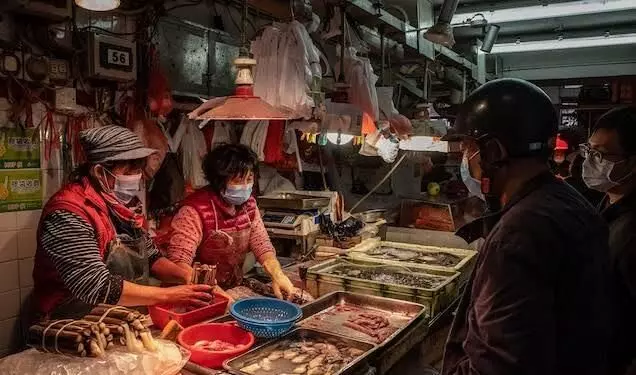
Markets selling live animals pose greater risk to human health, biodiversity: Lancet
text_fieldsNew York: A new study published by the scientific journal, Lancet has revealed that the markets selling live wild animals pose the greatest risk to human health and biodiversity.
According to researchers from Princeton University in New Jersey, the US, the markets that sell live wild animals are connected to emerging infectious diseases.
However, the researchers also noted that a widespread shuttering of all wet markets could have the unintended consequences of disrupting critical food supply chains, stimulating an unregulated black market for animal products, and stoking xenophobia and anti-Asian sentiment.
After finding a link between Covid-19 and a seafood market in China's Wuhan, many governments around the world have pushed for the closing of so-called "wet markets".
The paper, published in the journal The Lancet Planetary Health also added that that policymaker should target these markets as they attempt to mitigate future infectious disease outbreaks.
On the other hand, a majority of the informal markets, which specialise in fresh meat, seafood, and other perishable items in open-air settings, pose little risk to human health or biodiversity.
" said
David S. Wilcove from Princeton's Center for Policy Research on Energy and the Environment said that the temporary shutdown of wet markets by many nations in the wake of the Covid-19 pandemic will not last. He added eventually some will be opened up while others will be more closely regulated or closed altogether.
"Our work presents a way to tell which ones are worth focusing on for tighter regulation or closure," he added.
Further, the researchers also emphasised that these markets alone are not solely responsible for global pandemics. Instead, they represent one node of zoonotic transmission potential along the global wildlife trade supply chain.
In April, the World Health Organisation (WHO) had called for a halt to the sale of live wild mammals in food markets to prevent the emergence of new diseases such as Covid-19.
WHO, the OIE (World Organisation for Animal Health) and the UNEP (United Nations Environment Programme) had earlier called on all national competent authorities to suspend the trade in live caught wild animals of mammalian species for food or breeding.
The agencies also directed to close the sections of food markets selling live caught wild animals of mammalian species as an emergency measure unless demonstrable effective regulations and adequate risk assessment are in place.
The agencies added that there was a strong association between the sale of live wild animals in markets and the emergence of new viruses in humans.





